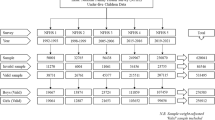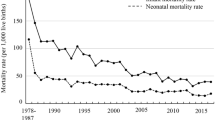Abstract
IN the course of investigations into the maternal and infantile death rates of different areas, carried out in connexion with the work of the Joint Council of Midwifery, it has been discovered that a hitherto unsuspected correlation between these two rates exists if they are charted in successive years instead of in the same year, the infantile rates being shown for the year preceding the maternal. It has also appeared that this correlation, which is very marked in distressed areas, and especially during years of industrial depression, is lessened and even reversed in prosperous districts and in good years. The average level of both rates is also much higher in districts in which unemployment is severe than in other areas. The maternal death rate of the five principal coal-mining counties, for example, for the years 1928–34 is 41·05 per cent higher than that prevailing in Middlesex and Essex, and for the years 1927–33 the infantile death rate is 50·98 per cent above.
This is a preview of subscription content, access via your institution
Access options
Subscribe to this journal
Receive 51 print issues and online access
$199.00 per year
only $3.90 per issue
Buy this article
- Purchase on Springer Link
- Instant access to full article PDF
Prices may be subject to local taxes which are calculated during checkout
Similar content being viewed by others
Author information
Authors and Affiliations
Rights and permissions
About this article
Cite this article
WILLIAMS, J. Infantile and Maternal Mortality in Relation to Nutrition. Nature 137, 529–530 (1936). https://doi.org/10.1038/137529b0
Issue Date:
DOI: https://doi.org/10.1038/137529b0
Comments
By submitting a comment you agree to abide by our Terms and Community Guidelines. If you find something abusive or that does not comply with our terms or guidelines please flag it as inappropriate.



